City Government
Siemens’ New Tech Developed in PTC, Intuitive’s “Change in Conditions” Request and more [Podcast]
Published
2 years agoon
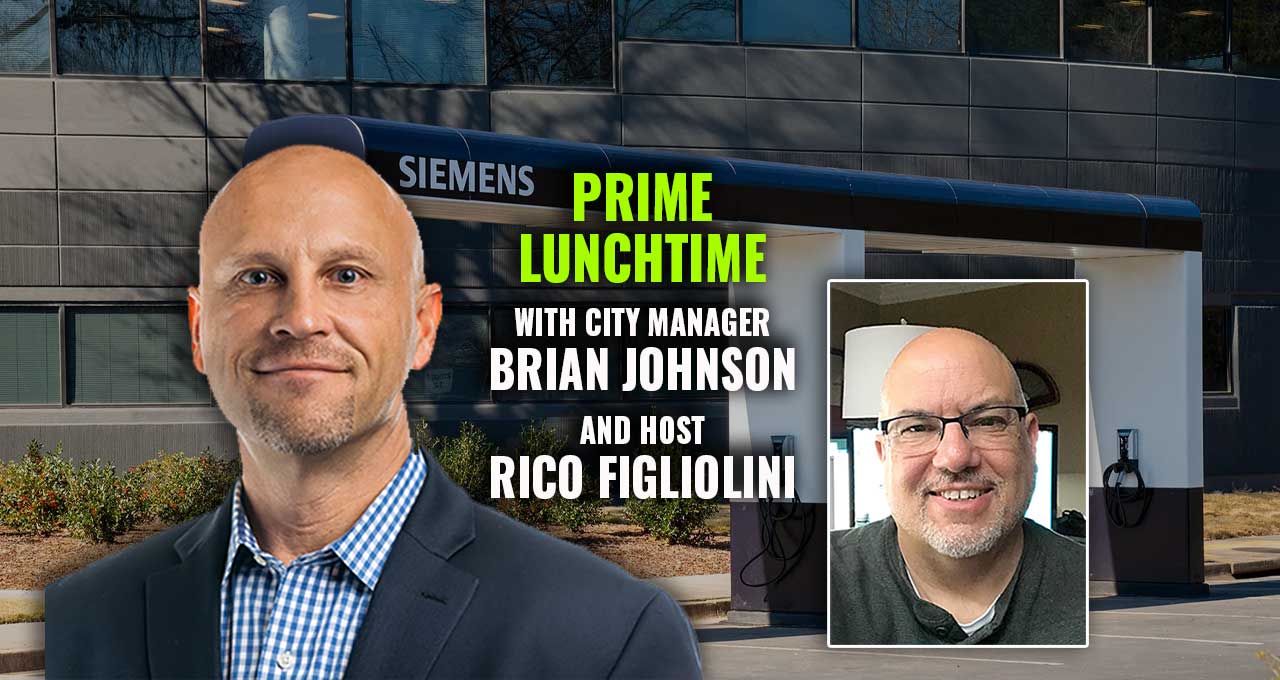
Siemens unveiled a new futureproof EV charging prototype designed and developed here in Peachtree Corners, their R&D hub eMobility, and North American Headquarters for Electric Products. Intuitive’s “Change in Conditions” request turns out to be for an assembly of products, not manufacturing. Plus, talk of “Silicon Orchard,” East Jones Bridge multi-use trail project, a Chattahoochee pedestrian bridge, slowing down drives in Town Center. Listen to City Manager Brian Johnson and host Rico Figliolini, all on Prime Lunchtime with the City Manager.
Timestamp (where to find it in the podcast):
[00:00:30] – Intro
[00:01:58] – New Siemens EV Charger
[00:06:23] – Silicon Orchard vs Silicon Valley
[00:12:15] – Intuitive Rezoning
[00:34:42] – East Jones Bridge and the Riverlands Project
[00:40:12] – Town Center Playground Groundbreaking
[00:41:28] – Town Center Speed Tables
[00:43:09] – Closing
“It’s the next evolution. This electric vehicle revolution that we’re in, is happening fast. It’s interesting as we have had a front row seat on this stuff. Both because of Curiosity Lab and because of the companies that are corporate tenants here, like Siemens. We’ve got a chance to experience it.”
Brian johnson
Prodcast Transcript:
[00:00:30] Rico: Hi everyone. This is Rico Figliolini, host of Peachtree Corners Life, and today prime Lunchtime with the City Manager, Brian Johnson. Hey Brian, how are you?
[00:00:38] Brian: Good. How are you?
[00:00:40] Rico: Good. Appreciate you making time for me today. I know that you are at a very important meeting, so we’ll get into that. I just want to say to everyone here that, this is brought to you by Peachtree Corners Magazine. The sponsor of this and our other podcasts. We’re looking forward to working on our next issue that you’ll be seeing. So if you’re interested in sending us nominations, by the way, for the Faces of Peachtree Corners our deadline is March 1st. So check out our website it’s on there. It’ll tell you 12 and up and the type of nominee we’re looking for. And we’ll be sorting through that after March 1st. So feel free to find someone that’s 12 years old and older that has an impact on our community in some way, whether they’re a business owner here or live here and have a commitment maybe through their school, maybe their athleticism, maybe technology, non-profit work. Let us know, we’d love to share that in our next issue. So now that I’ve said that let’s get on with the show, if you will, because there’s plenty to talk about. And the first thing probably would be where you came from, tell us a bit about that. About a company that we all know is in Peachtree Corners, but we didn’t know how big of a presence they really have based on what we’re doing here. So talk about that a little bit.
[00:01:58] Brian: So I just got back from like you said Rico, sometimes the surprising things that are happening right underneath your. daily activity, right underneath your nose. I was just at a big unveiling event from who is currently, at least, our largest employer. And that’s Siemens. People do know that Siemens has had a presence here that predates even the city’s birth.
[00:02:23] Rico: Oh yeah, sure.
[00:02:24] Brian: And I believe they’ve had a large presence here, I think they said 2004. The event was for Siemens to unveil a new electric vehicle charging system that was created and developed here in Peachtree Corners.
[00:02:40] Rico: It’s unique, in some ways, if I understand correctly. And they’ve been putting it out or releasing it in some way, I think in Germany and Australia, if this is the same system that I’m thinking.
[00:02:51] Brian: It is. There are some unique stuff. So some of the simple unique things are, is all the material is recycled material. So there’s a sustainability part. And then it’s an AC, not a DC charger. Of course on the AC chargers, they’re slower. That’s generally what you have at home. Almost like a trickle charger, it takes many hours to charge a vehicle all the way up. So it’s not a DC fast charger, but the reason it’s a big deal is, DC fast chargers are expensive. And they take a lot of power and this is an AC, but instead, most AC ones right now are about seven kilowatt. And this is fourteen. So it doubles that. So it’s going to decrease the full charging time using these types of chargers in half. And it’s got some other technology. And it’s again, the next evolution. This electric vehicle revolution that we’re in is happening fast. It’s just interesting as we have had a front row seat on this stuff. Both because of Curiosity Lab and because of the companies that are corporate tenants here, like Siemens. We’ve got a chance to experience it. So we were invited to be part of this event. Mayor had some remarks. We were joined by one of our public service commissioners, a great friend of the city Vice Chair Commissioner, Tim Echols. Our US representative Carolyn Bourdeaux was here. And then the CEO of Siemens, North America and the head of all of Siemens Global Smart City and Global E-Mobility. And what we didn’t realize, what the city didn’t realize, and we knew Siemens was here. They have a large presence here. It’s so ironic that the buildings, some of the buildings they moved out of, they just basically relocated a mile down the road about a year and a half ago. They were on Triangle Parkway, they left those buildings and they moved over to Parkway Lane. Parkway Lane and Jaybird Alley.
[00:04:50] Rico: Staying in the city versus choosing, moving out of the city.
[00:04:53] Brian: Great point. So they stayed here. They have just under 600 employees in the city. So currently they’re the largest employer. The irony I was going to say, is the buildings they moved out of Intuitive bought. And Intuitive is moving either into some of them or they’re demoing them, and that’s the site that they’ll build the new buildings on. Anyway, two great corporate tenants of the city. But Siemens is, of course their headquarters is in Berlin. They’re a German company but their headquarters for global mobility, it’s here in Peachtree Corners.
[00:05:30] Rico: And the city didn’t know about this right?
[00:05:32] Brian: So all of their research and development for mobility technology devices, anything that they’re creating or wanting to create is all done here. We both were kind of scratching our heads, as we talked about what we’re doing and we’re like, why are you not in Curiosity Lab? And they’re kind of like, why are we not doing stuff in Curiosity Lab? And we’re both looking at each other, like, how is it that we were not? Literally one end of Curiosity Lab is a quarter of a mile from their building. If you just go right across the street from where Marriott is right onto Jaybird Alley, you clear the Walgreens and then the next right after that, will go to Pond. The very next right after that is the Parkway Lane. And that’s their building.
[00:06:23] Rico: It’s interesting how Curiosity Lab is out there and putting things out there, all the news about it and stuff. And yet, some of these people may not live here. They may not be aware of what’s going on in the city like that. Because they’re doing their work, their corporate work. This COVID in the last two years also has probably changed a bit of that. And maybe people are coming back, maybe it’s hybrid. This whole idea we talked about before. About how this whole area of Atlanta, northern arc of Atlanta, maybe Buckhead, maybe Alpharetta for sure, and Peachtree Corners over the last few years getting into it. And like you were saying pound for pound, we’re probably bigger, per capita, in technology than even Alpharetta is. This whole area, Silicon Orchard versus Silicon Valley. It’s a great phrase that you guys talked about. And maybe now we can start seeing that being used, talking about the technology that’s here and the companies that are here. Probably companies we still don’t even know what they’re doing inside. Because there are lots of companies here in Peachtree Corners that people don’t even know about and what they do. Just to find this out. Another place, another company to be taking advantage of Curiosity Lab.
[00:07:34] Brian: And then just doing great things in their own right. So what we’re really liking to see here, Curiosity Lab had some degree of a role in Intuitive choosing this location. So then Intuitive’s going to build this headquarters and then Siemens got all this mobility going on, all this electric vehicle, and they’re also the North American headquarters for their smart facility tech. So the things they make to go inside a building. Sensors to control your air and heat, and lighting controls, all that kind of stuff is also done here. Intuitive was peaked, when I brought it up once about Siemens having a large presence here. Siemens was very interested in discussing Intuitive more. So there’s already a synergy that starting to go on that we may not even have anything to do, but we’ve got two corporate tenants of the city. One is the current largest employer, the other one will become our largest employer. And they’re talking about doing stuff together and you start throwing in companies like T-Mobile whose presence is growing in Curiosity Lab. They’re starting to get some energy and synergy amongst this stuff. And that’s how areas get made. That’s how Silicon Valley was created, is because of companies wanting to be close to each other, working together. And pretty soon this ecosystem starts growing. It just grows upon each other.
[00:08:58] Rico: It makes sense because they’re researching, I mean, Silicon Valley grew out of Microsoft and then Apple and all these companies go in there and sharing employees, sharing ideas, talking about the technology and stuff. I mean, we have Ashrae here, they just built a net zero carbon facility. I think it was finally certified that that’s what it is. So companies and associations and groups like that, just going to drive some of this technology. There is more out there that we could talk about, I’m sure, of companies similar. But this is just one step. I just saw that release come across a Yahoo Wire today about Siemens and Nexii unveiling that sustainable, cost effective, electric vehicle charging prototype that they’re putting out in Germany and Australia and all these places, so.
[00:09:42] Brian: Developed here. Created in Peachtree Corners.
[00:09:46] Rico: That’s it. And I think when other companies talk about it, when financial institutions talk about it, when other firms that want to take advantage of the technology, talk about it, or partner with them. They’re going to be saying based in Peachtree Corners. Hopefully, I mean, I’d see more of that happening. Yet some printers may say, you know, based in Atlanta, because Atlanta everyone knows. But I think over time, like we discussed, Silicon Orchard is the name that we really should be in this area because of the amount of, I mean, Alpharetta has 700 companies. We have hundreds of companies as well that are, high-tech companies.
[00:10:22] Brian: And Rico, just so you know, for those who may be viewing don’t know the Silicon Orchard thing. It was about a year ago, we were on a, an analyst call with a bunch of tech analysts that report on tech for wall street. And when we got done talking about Curiosity Lab, one of the analysts was like, this is the kind of stuff I hear when I’m talking to cities in Silicon Valley. He’s like, but you’re not, you’re in Georgia and Georgia is the peach state and there’s peach orchards. Maybe you guys should be Silicon Orchard. Okay. And that started to take, that started to grow legs. And so for those who haven’t heard it, that’s why. And it’s more than just us. It would be. I mean, Silicon Orchard is not just one place. Research triangle in North Carolina is not just one nor would Silicon orchard. But maybe there is something to the fact that we have a growing tech industry in various areas like FinTech and others that maybe it will stick.
[00:11:18] Rico: For sure. I think that finance companies, investors, other companies, that it’s interesting how marketing also wants to have a name for a place. And so maybe this is the name that’s going to stick. Think about it, Hollywood had the monopoly on filmmaking for years. And then all of a sudden, yes, you would get films shot in New York and stuff, but things would be Hollywood. But then we had the Walking Dead and then all of a sudden, because of Georgia’s incentive program, which hopefully will stay in place, brought Hollywood east to Georgia. I mean, the, the amount of movies and TV shows made in the Metro Atlanta area and outside the rest of Georgia as well, is unbelievable per capita. You’ve got Netflix.
[00:12:01] Brian: Disney just filmed in City Hall last week, a show called Class of ’09 that’ll be out on Hulu late summer, fall. But they just filmed him in City Hall. You know, a lot of scenes in Ozark are filmed here.
[00:12:15] Rico: That’s right. So you have Ozark filming in Technology Park area in and around different areas like Jones Bridge Park and stuff. Netflix, HBO, Amazon. There are a whole bunch of companies, streaming companies and production companies that film here for a good reason. And no different with Silicon Orchard, that people will get to know that. And if they get to know that, then they’re going to maybe want to relocate the same way, Intuitive robotics did. Makes a lot of sense to me. Now talk about Intuitive Robotics and getting down into the city things, this is more, national, bigger picture. But we also have things that go on in a city that people need to know about that are day-to-day. We talked about this before the show about things that affect people’s lives and stuff in day-to-day activities. On our website, the biggest articles that get the most views are stuff like the roundabout near the Forum, that proposed roundabout there. The East Jones Bridge Trail, the sale of the Forum, which for those that don’t know, it’s been pushed back for about two weeks now, the purchase. Nothing in particular, but just because they’re working out financials and stuff. So let’s talk a little bit about Intuitive Robotics because there was some changes in zoning, a special use, that some people got incorrect. Because they are not a manufacturing company. So let’s get that settled a little bit. So give us some detail on that.
[00:13:33] Brian: Like you said Rico, I mean, some of this stuff, we talk in broad terms. We’ve been talking about intuitives $600 million east coast campus being built here and that’s all great. But when you build something, when something changes, the devils, it is in the details. And there are a lot of details. And in this case, Intuitive has about 40 acres that they currently own. There are a lot of buildings on these 40 acres. In fact, really all of the 40 acres they purchased were individual parcels with existing buildings already. So they assembled all these parcels and they’ve created a master plan. And some of these building, you know, so they’re phasing it in. They worked through. Alright, we’ve got to build this first and then we’ll move temporarily, these employees over here and then, you know, they’re doing all this stuff. So there’s all these pieces moving around. But unfortunately these are pieces where each parcel has constraints to it because it’s a redevelopment. And why that’s important is if somebody had bought 40 acres and they wanted to build a medical campus, there’s a lot of flexibility that they would have if they had a blank slate. If it was developed 40 acres and they could just master plan the whole thing, where all the buildings go and they can do it in a way that was the least impactful to surrounding, so on and so forth. In the current case with Intuitive, the assembly facility, in which they are going to be assembling, not manufacturing, but taking components that were manufactured at other places and putting them together and doing the quality control component to this stuff and get them certified. Because the FDA has to certify these machines. That’s what’s going to be done here. So it’s an assembly facility, it’s not a manufacturing. But anyway, the only place that they could put it with the little game that they had to play about moving things around was on a particular parcel that is next to existing homes.
[00:15:53] Rico: Those conditions that were originally on that parcel goes back to the 1980s, if I remember correctly.
[00:16:00] Brian: That is correct. So in 1980, essentially, Peachtree Station started to get developed. And some of these homes along where Intuitive now owns were built. Then in ’82, the parcels were rezoned. The parcels that Intuitive owns that are next to, about 10 homes on the back of Peachtree Station. It was rezoned M1, light manufacturing in 1982. But then in 1987, as part of the construction of one of the buildings on this M1 zone parcel, there were extra restrictions placed. Extra conditions placed on some of these parcels. One of them in particular is one that Intuitive owns and it had two specific things that were conditions that Intuitive requested a change to from 1987 to now. One is, it had instead of the normal 50 foot buffer in between the residential and the M1, it had an additional really 40 feet, 30 feet of undisturbed buffer, and 10 feet of a landscape planted, landscape strip. So this 90 feet, one of the things Intuitive, when they position their building needed is a variance from a section of their road encroaching into that 90 foot buffer. They needed about 20 feet, well they needed 14 feet into the 90 foot buffer and they needed to be inside of that buffer for about 20 feet. So inside the buffer for 14 feet deep, 20 feet long.
[00:17:49] Rico: So not the extent of the property line, just a portion of the property line.
[00:17:53] Brian: Just a corner. It was coming out of the building and just went into the buffered area and out. So they asked for a variance on that section of road. And then the, I guess that would be the northern end of the building, one end of the building. And their assembly facility is more of a longer, narrow building for a number of reasons. Especially given the constraints of the property, one end of the building encroached into this parcel, that had these unique conditions. And one of the conditions in this parcel, the other thing that Intuitive needed the city to, or they requested the city to grant a variance was on stories. So the parcel that was restricted in ’87 has a stipulation in there that no buildings can be taller than one story, but it doesn’t give an actual height. So because of that, the actual height limitation in an M1 zoning is 40 feet within 150 feet of the property line. And then outside of 150 feet, it can go up to 55 feet and then outside of 200, it can go as much as 85 feet. That’s the maximum height. I only bring that up to say that the conditions were that no building could be more than one story. But it doesn’t have a height restriction beyond the core zoning. Intuitive had about 70 feet of their building encroached just inside of this parcel. 4% of their building was inside of this parcel that had a restriction against anything more than one story. And the assembly building is three stories. On the end farthest away from the homes, it’s only two stories above grade. On the side of the building closest to the homes, because the first floor is into the ground because, you know how it goes as you dig into the, so. But it was more than one story. So they asked for a variance. And over the course of really two very intense weeks between, well, actually a month. I’m sorry, not two weeks. The last two weeks were intense. But since the planning commission met last month until city council’s vote, Intuitive had a lot of communication with the residents and made a number of, improvements, enhancements, and changes to their application, such that the product that they ultimately went to the city, remove the requests for the road to be in the buffer. They redesigned the way that traffic would circulate and they pulled the road, they were able to pull it out of the buffer. So now they’re only coming to the city for one request. And that is to vary off of the stories. And say, please remove the restriction against only one story because we, 4% of our building in this parcel, is two stories on their side. While they were talking to the residents, there were a number of concessions and improvements that Intuitive made to try to lessen the impact of what was considered by the adjacent property owners to be at a minimum, an additional floor height impact on there.
[00:21:34] Rico: So what were some of those conditions?
[00:21:37] Brian: Yeah, so the conditions are Intuitive, let’s start with, let’s see, noise. They reduce the amount of loading bays from ten down to five that are along the side of the building closest to the residence. The loading bays that are close to the residence are bays in which the vehicle goes all the way inside of the building and a door shuts behind them. So any of the loading is done, is inside the building for the delivery vehicles like Amazon, FedEx, UPS. There are two exterior loading bays on Spalding, that you would have an 18 Wheeler could back up and you would have essentially external loading. But that is facing Spalding, not the neighborhood. So they reduced that. They enhanced the buffer. So there is anything from 50 up to 90 feet between 10 parcels that adjoin Intuitive. Five houses are in this SUP area where they had the 90 foot enhance and then five of them were not. But Intuitive came in and said look, the intent of all of that was to try to keep the impact of our operation as minimal as we can. So we’re going to over plant the buffer. We’re going to add a lot of plant material. We’re going to add understory plant material. Because right now most of it is open, what most of are pine trees, like Loblolly Pines in which you gotta be 60, 80 feet before you even have pine needles. Under it, you can see right through it. They’re planting shrubs for the lowest and understory trees in the middle. Magnolia that are evergreen all year round shield all the way up, not just on the top levels. So they’re adding a security fence or basically removing all the chain link fences that are on the back of the adjoining property owners and replacing it with their own new heavy gauge metal security fence that is not claimable and it will be eight feet tall. And then inside of that, so that’ll be on the property line, but then remember there’s a buffer. So then Intuitive has to come off 50 feet for five of the adjoining houses and 90 feet for the other ones before they can build anything. And there’s a ridge line, it’s like the highest point in that area. Some of the properties, there is a wooden fence that was placed there back in the day to shield maybe a little bit of noise, but mostly lights from vehicles shining into their back window. And so Intuitive is going to replace that fence all the way down and put one all the way down to tie into the rock wall that basically serves that purpose right near Spalding. So they’re enhancing that. They are, let’s see what else did they agree to do? There’s a maintenance bond of three years. They’re putting money into the maintenance bond. And if there’s any trees that have died three years after, the city will draw down off of that maintenance bond to replace all the trees. Those kinds of things, but they did come back and say, we still need this building to encroach into the buffer and we don’t want any height restrictions into the future because we don’t know exactly what we’ll do with the remainder of that parcel that has this restriction of one story. So the request was to just remove reference to story, because right now before it said building can’t be more than one story, and instead replaced it with building can’t be higher than 40 feet. So it didn’t matter how many stories inside and their contention was, these people don’t want height. Inside, does it really matter how many stories there are? It’s more you know, limit the height. And they did agree that they would not do anything above 40 inside of 350 feet of the property. So they even agreed to, if they ever in the future and they don’t know what they’ll do. Their contention was, we haven’t, master-planned exactly what we want to do with that particular parcel. They even talked about, maybe it’s greenspace for their employees there. Maybe if it is only still one story, but they were like, we don’t want to be limited unnecessarily before we know all of that. So they’re like look, we’re prepared to push all of our stuff as far away as we can to enhance the buffer. Things that they didn’t have to do. Those were all, those were not requirements of theirs.
[00:26:29] Rico: This is what people or companies come back and do right? Within the compromise of getting what they want, they’ve done certain things. And no company wants to come back multiple times so I can appreciate how they want to take care of what they’re taking care of now to give them that freedom later.
[00:26:48] Brian: Now Rico, I will tell you so that all is good. All well and good. A lot of thought went into this, a lot of back and forth. But unfortunately, when the sausage was getting made, there was a couple of things that happened. One is you know, Intuitive when they were meeting with some of the residents and some of these meetings happened without the city’s involvement, they had people that were speaking on behalf of the organization about things into the future that they either didn’t have the rank to do or they weren’t experts in this. And so at one point, this parcel that we’re talking about that had that one story restriction actually has a building on it. If you remember it was about five years ago, we put in a big company called CGS that had a big call center in there. It’s their building and so Intuitive bought it. And they are temporarily using that facility to start assembling DaVinci systems while they build the permanent one. As soon as they build the permanent one, they’re going to move everything out of the temporary one into the new one. And then they’re going to demo the current one. What they didn’t know is what will you do after you demo it? And at some point, one of their teams said, oh if we build anything, it will be more than one story like the current building. The residents rightly so heard that, and they’re like, okay. So when Intuitive’s official application for the city council meeting came in, it had 40 feet. They asked for removal the height or the, excuse me, the number of stories and just 40 feet. Anything closer to, well 40 feet even though they could have always done 40 feet in the mind of the adjacent property owners, they’re like you said, one story like the current building and the current building is only 23 feet high.
[00:28:50] Rico: So that’s how they got that.
[00:28:51] Brian: Yeah. So they, you know, so Intuitive created their own problem by not managing expectations. Instead of saying, look, we don’t know. They came up with at council meeting and they were called out on it and they owned it and just said, look, we spoke prematurely, and we don’t know exactly what we want to do. We are happy with the restrictions of height that were in there from day one. We’re prepared to keep that height restriction much deeper into the parcel 350 feet versus 150 feet, if it hadn’t been. But we don’t want to limit ourselves now when we don’t know what will happen and we don’t want to have to go through this process again. And like you said, you get it, but then conversely, I understand how the residents feel, the adjacent residents. And I told a few of them this, not only do I sympathize with them, but I empathize with them because I just got done going through this essentially as a resident with Waterside. Well not just essentially, I mean, as a homeowner, my property backs up to the old Fiserv now Waterside property. And so we went through the same thing as adjacent property owners. As we had, mine was at an area of the old Fiserv campus that didn’t have any buildings. It was a very remote area. I mean, it was like, they had walking trails back there. I mean, it didn’t have any building and now they’re wanting to build townhomes and stacked flats in an area that had not been. And so I empathize with change, it’s going to be a little bit different. There had been a 23 story or excuse me, 23 foot building there. And it could be 40 feet in the future as much as that. I, I get it. What they get out of it is an enhancement to that buffer that they would’ve never had, had Intuitive not felt like they needed to give something back in order to be able to say, Hey, we did everything we could to impact you the least. So I appreciate how they feel. Nobody likes change. I just went through it two years ago, fast forward, two years later, I have a better buffer. It was planted with evergreens. It has very much enhanced the buffer site lines of me having to see in there. You can’t as much. We both win essentially.
[00:31:19] Rico: It’s interesting how things have changed since I moved here in ’95. We’re not a seaside resort that wants to remain looking a certain way or a historic downtown area that may want to remain small. Norcross, for example, tried to do that. And because of that, they had no activity. A lot of retail went out of business because there was no activity there. There’s the old time owners of old buildings. Until they started doing some development work, they weren’t able to revive that downtown area, for example. We’re not seeing that here, and I empathize too. I understand that, not wanting to have noise and stuff like that. I hear more sirens going on you know, then I did, let’s say a decade ago. But that’s part of life. When things become a little bit more urbanized as they will. But I’m glad that intuitive is trying to be a good neighbor. And they’re trying to do what they can. They have a city manager that can empathize with the people that live in the area. You’ve gone through this, apparently. There are things that are going to change. It’s just that we are not the eighties, Paul Duke Tech place that we were, and things are changing. It’s a different environment. Companies are becoming more hybrid employment areas. It’s going to be less footage for certain things. Certainly, the thought that it was manufacturing, now that they understand, the people understand it’s an assembly plant. You know, manufacturing denotes, maybe smoke sacks or a lot of waste.
[00:32:49] Brian: A lot of noise, yeah.
[00:32:49] Rico: Clanging and all that.
[00:32:53] Brian: You will never know there’s really anything. I mean, one of the advantages is the building that they demoed to build the new assembly facility had 120-ish parking spaces adjacent to the current owners. So for decades, there have been in the morning cars driving in, doors slamming shut, the sound of cars starting. Potentially in the winter when it was dark, headlights as the cars turn on, or even in the morning. And you know, that’s being removed because there won’t be any parking there, it’ll be a drive aisle for, along that side for those smaller delivery vehicles that will drive inside the facility to unload. So they won’t even be, but again, it’s change. Change can be scary. Change, when you’re used to something, even if the change might on paper be an improvement, you’re skeptical. But I get it, all we can do as a city is hold Intuitives feet to the fire. I’ve every, you know, every belief that they will do the right thing without needing that. But at the end of the day, the adjacent property owners do have a buffer that has brand new fencing, both security and an opaque privacy fence. And heavy planting inside this buffer of various heights, something that they would never have had before. So they do get something out of it. And I can’t imagine when you’re creating jobs with an average salary of 150,000, that there won’t be some of those new Intuitive employees that wouldn’t like to live right there one day anyway. Houses are up for sale.
[00:34:42] Rico: Talking about change, just to change the subject, if you will. This is a good change, that’s coming, right? East Jones Bridge, multi-use trail project, that’s beginning this week. You know, that’s a continuation of a project that’s been ongoing through different parts of the city. And I know there’s a lot of interest in that. It’s good change, it’s a different type of change. So why don’t you tell us a little bit about the multi-use trail expansion that’s going on there?
[00:35:08] Brian: Yeah, so the section of East Jones Bridge is going to be all the way from 141 to Jones Bridge Park, so that whole length. And then it’ll all be just one side of the road, just the north side of the road. And it’s part of two programs, if you will. One is the city zone multi-use trail system that we’re putting in the city. So we’re doing that anyway. But in this particular case, it will be part of the River Lands Project. The River Land Project, for those who don’t know, is a Metro Atlanta project to have a trail system that follows the Chattahoochee the best it can from the Buford Dam all the way down to, it’s south, south, yeah of Atlanta. It’s like a hundred mile system. And, when I say the best you can, because of development, there are places. The back of Neeley Farm is a good example. the lots, some of the lots there, their lot line is actually the edge of the Chattahoochee, the river bank itself. Nowadays you have to pull back off of there and the federal government owns a much wider location on each bank. But back in the day, some of these purchases predate like the Metropolitan River Protection Act. And we’re going to, this is going to be a section that we’ll get as the Riverlands Project comes down out of Johns Creek. It will end up going along 141 from the Chattahoochee or where, you know, Peachtree Corners and Johns Creek, up 141 until it gets to East Jones Bridge. And then it’ll turn right. You’re coming from John’s Creek. And then that Riverlands Trail will take our multi-use trail and get to Jones Bridge Park. The next phase of that is a pedestrian bridge over the Chattahoochee where the old Jones Bridge itself was. And on the other side of Jones Bridge Park is the national wildlife refuge.
[00:37:19] Rico: Yes. That’s going to be awesome.
[00:37:22] Brian: And then you turn left and go along the national wildlife refuge until it gets to Holcomb Bridge Road.
[00:37:27] Rico: And it’s going to be a 12 foot wide, concrete, multi-use path.
[00:37:31] Brian: It is. So, part of our multi-use trail was also to provide a path for multiple uses. So in this case, the sidewalks put on East Jones Bridge back when the county put it in are only three feet wide. And so as a result, there’s a lot of people who run in the road in the morning. Or even kids sometimes that are riding their bike to Simpson or Pinckneyville are interacting with people on a very narrow area for both of them to interract. And so we just said, you know what? That is a good way to allow for multiple types of uses in a safe manner. So there’ll be a lot safer for people to walk their dog, run, walk for exercise or even cycle. Probably with every type of cycling except, and I’ll warn those who think all cyclists should be on here. When you get into the spandex crowd, as I call it the avid cyclist. When you’re averaging between 15 and 25 miles an hour.
[00:38:30] Rico: They still have to be on the street.
[00:38:32] Brian: You can’t be on a multi-use trail. You’re going to have to be on the road. So that would be the only crowd that probably, you’ll still see out on the road. But everybody else, including the more recreational cyclists or definitely kids cycling, they should be using this.
[00:38:48] Rico: Yeah, 12 feet’s wide enough to be able to accommodate pedestrians as well as, like you said, the casual cyclists. So because I’m sure people will ask, the pedestrian bridge going over the river, whose project? Who’s paying for it? What is the planned thing on there? Is this part city, or is this something else?
[00:39:07] Brian: I don’t know. I can’t answer that because we don’t know. It is not a city project that is going to take assistance all the way up to the federal government. Because you are now spanning a waters of the state, as it’s called, a waterway. That’s a big deal. You’re going to have to put something in at least mid-span probably that would impede water flow somewhere around the bank. That’s gotta be looked at. So you have environmental impacts and you’ve gotta deal with all of those groups. And it’ll probably take, it’ll probably be a mix of funding. I wouldn’t be surprised if the city has something in it, but then the county is interested. The Riverlands Project has funding. The state’s interested in this and there’s a lot of federal dollars on grants for recreational amenities like this. So I actually don’t think that the funding of it’s going to be the problem. A pedestrian bridge over that is probably going to be in the $4 million range, plus or minus. It’s not a huge amount of money. I think it’s going to be getting all the regulatory, you know.
[00:40:12] Rico: That’s where most of the work is. So just to go through a couple of other quick things, because we’re like right past where we normally go. I know that there was a groundbreaking for the Town Center Playground. That’s still on track, I think for May. May something to be opened May 18th?
[00:40:31] Brian: Yeah, well, so I don’t know what the date, late May is when our first big musical concert. That was our goal is to have it in by that concert because we know we’re going to have a lot of people. We are on track to have it happen as long as two things cooperate. One is weather, when it’s time to do the work. And two, maybe more important than weather, and this one is the supply chain. If we can get all of the things, cause some of this playground equipment, this is not your normal playground. This is designed, fabricated, special playground stuff that you’ve never seen in Georgia, in the Southeast. The only one that we know of in the US is in San Francisco, of the type that they’re building. And so it’s special. And so sometimes when you have specialty material and it’s not made here, then you run into the supply chain.
[00:41:28] Rico: All good stuff, anyway. I guess the last thing I want to ask about too, because I just saw this somewhere, is that I think the Town Center is getting some speed bumps, if you will. Some pedestrian plateaus is what they’re called, I guess.
[00:41:43] Brian: Speed table.
[00:41:44] Rico: Speed table, thank you. because apparently some people can’t slow down in a retail area. Which is crazy because people are walking, kids might shoot out. So there’s some speed tables?
[00:41:55] Brian: Just one. It will actually be on, man I don’t even know if there’s a name of that road. It’s the one coming off of the roundabout, if you will, where the fountain is. If you are coming off of the fountain, driving away from the parking deck towards Medlocke where on your right would be Firebird’s. Then the pet store, I think is right after Hollywood Feed’s entrance there, on the left is the back parking lot for Verizon and some of Sprouts. So that stretch, that straight line stretch before you get to the townhomes, is a straight stretch. And once people clear that roundabout, they are going pretty fast. What they forget is right there at the end of the building. You’ve got cars coming out where Hoots.
[00:42:45] Rico: Where hoots was, actually.
[00:42:46] Brian: Yeah, where it was. But then you also, on the left, is one of the ways to get to that parking lot. So you’ve got cars coming out of a blind spot and other cars are, so that’s the only location it’s going to go. And it will also on the top of the table, like you said, it’s an elevated crosswalk. We’re basically putting to where that’s also where the pedestrians would walk across. Right on top of that speed table.
[00:43:09] Rico: Cool. Yeah, I think that’s a great place for that, actually. That is a long stretch and people I think, do forget, and they’re trying to get down to the roundabout or if they’re going the other way to get to the other road on the other side. I was imagining that would happen. So we’ve talked about a lot of things. I do appreciate your time, Brian. For clarifying some stuff and giving us some more information about what Intuitive is doing, about the new business of what Siemens is doing as well. And to also feed on some of this other stuff that you’re telling me as well. So thank you. We do this every month.
[00:43:42] Brian: Thanks for the opportunity, Rico.
[00:43:44] Rico: Yeah, no, this is great. If you have any questions for Brian or any thoughts, put them into the comments, if you’re watching this on Facebook and YouTube. And if you’re listening to the podcast on the audio, just share that or give us a review because that’s how people find us. Thank you so much. You all have a great week.
Related
City Government
Southwest Gwinnett Mayors Share Visions for the Future
Published
4 days agoon
July 22, 2024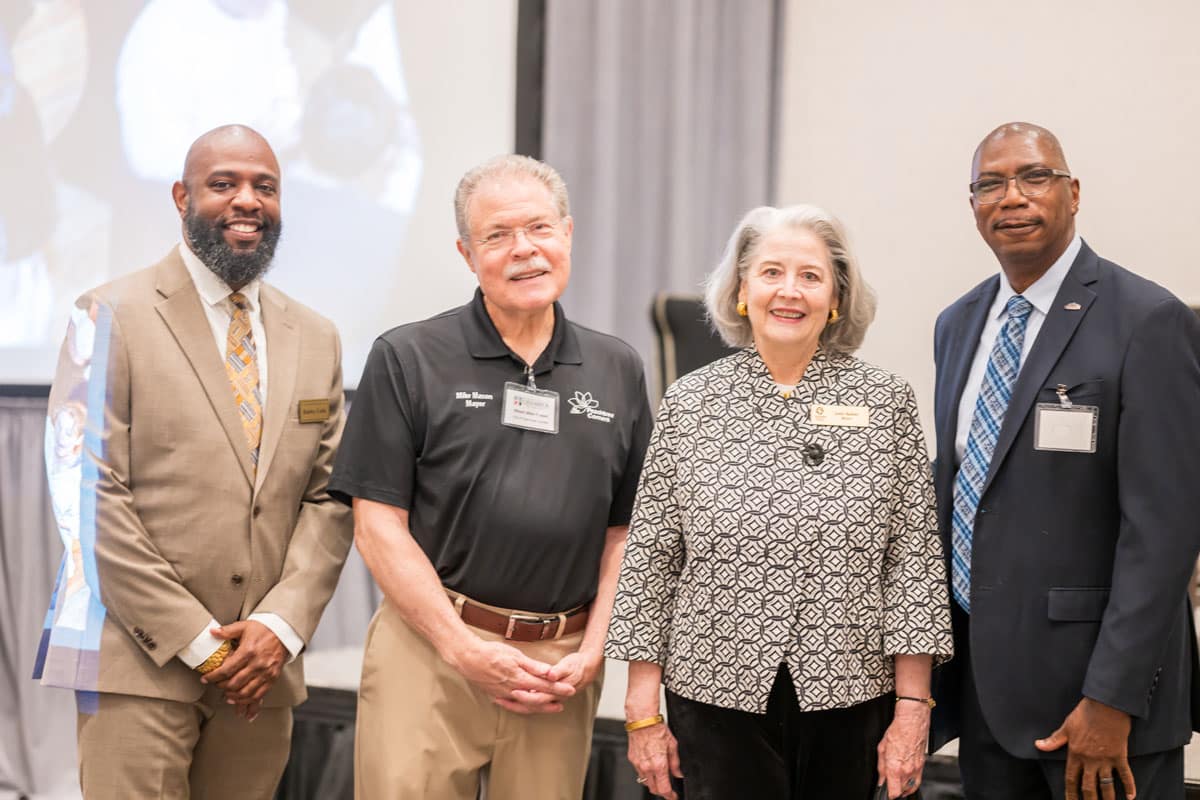
In what has now become tradition, the Southwest Gwinnett Chamber of Commerce hosted mayors from Berkeley Lake, Norcross and Peachtree Corners at a panel discussion on July 12 at the Hilton Atlanta Northeast.
The conversation centered around strategies for revitalizing and expanding metro Atlanta cities, with a focus on redevelopment, zoning ordinance reform, pedestrian and bicycle safety and investing in local schools and affordable housing initiatives.
Zoning changes
“We are beginning a really big project in our city. We have had ordinances that we’ve been working on ever since the city was incorporated in the 1950s,” said Berkeley Lake Mayor Lois Salter.
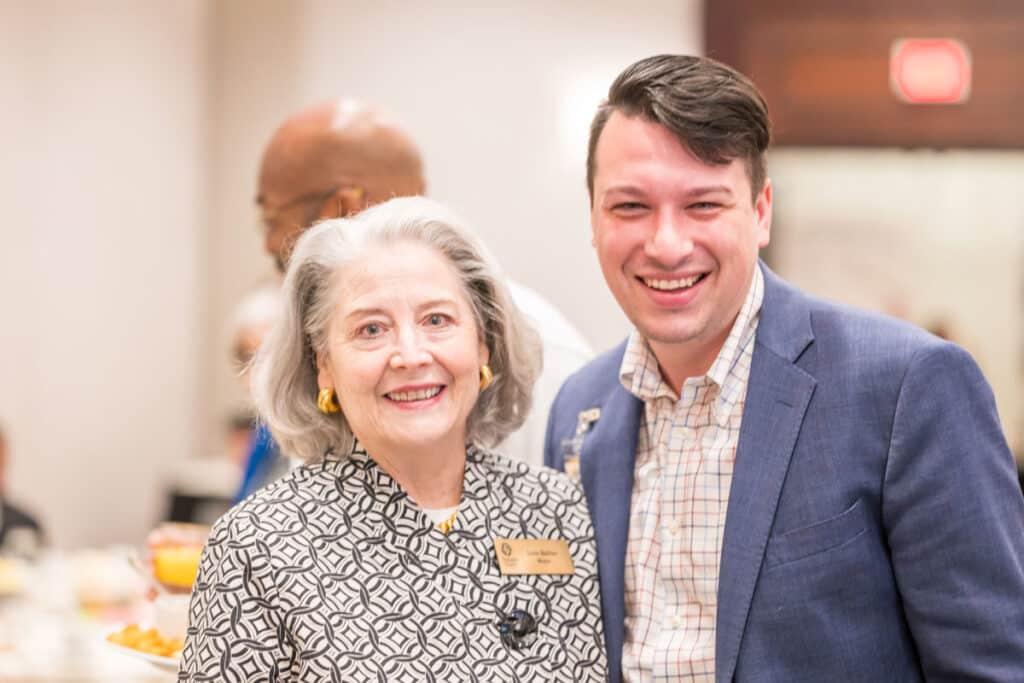
“We feel that we need to overhaul the whole zoning ordinance system and hire a consultant to come and elicit understanding and opinions from our citizens. We want them to be a part of that. We have some folks that resist any kind of regulation. They just want us to regulate their neighbors,” she added.
Norcross Mayor Craig Newton agreed that evolving needs are an important reason to change the zoning, and planning for what lies ahead is paramount. He pointed out that all Georgia cities must implement a comprehensive plan to maintain their qualified local government certifications and remain eligible for selected state funding.
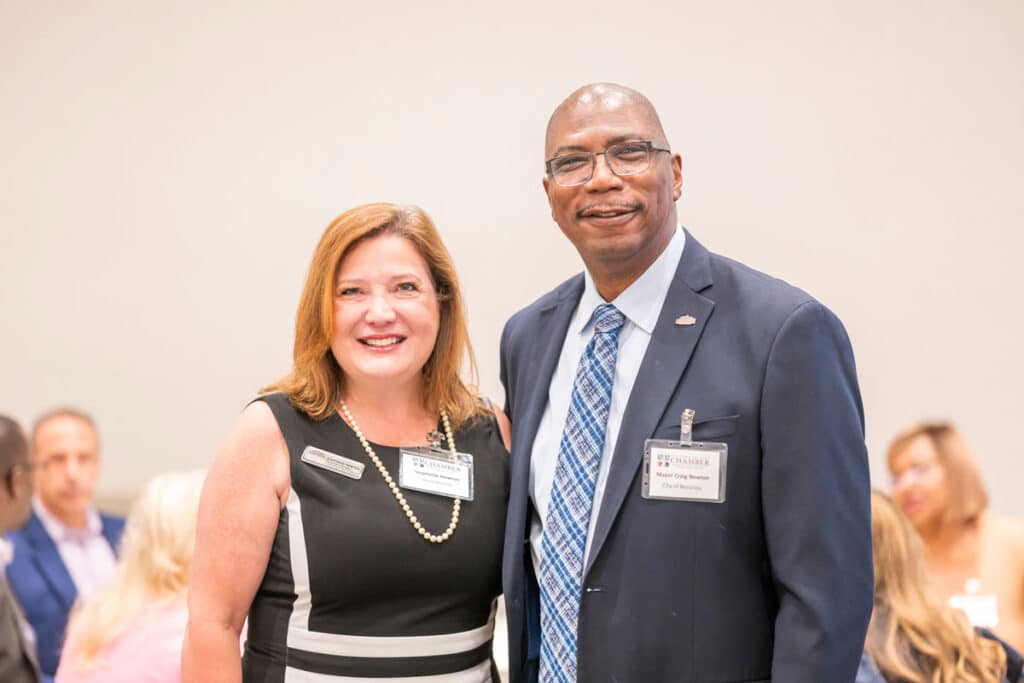
Land development
“We intend to focus on improving pedestrian bicycle safety downtown and establish a sidewalk activity improvement,” he said. “We’re also looking at approving parking in our town center and constructing the Norcross Greenway, which will bring a much-welcomed park, green space and a trail,” he added.
The county announced earlier this year that the project involves redeveloping the existing property into a park that will span almost two acres. It will offer various community spaces, including a multi-use trail, playground, covered picnic area, restroom building and a 41-space parking lot.
In addition to its amenities, a 12-foot-wide concrete trail segment will wind through the park and utility corridor, connecting Singleton Road to Dickens Road.
The trail is part of the 2018 Gwinnett Trails Countywide Trails Master Plan‘s Norcross to Lilburn Trail with an internal loop trail connecting to the neighborhood.
Commercial use
Peachtree Corners has had several “community-friendly” projects come online in the past year, but the effects of the pandemic continue to linger.
“When you think about the future, you’re thinking about the landmass and buildings and commerce. Probably the most significant issue facing a lot of us in the near term is modern office space,” said Peachtree Corners Mayor Mike Mason. “There’s a lot of space. The question is, are people going to come back?”
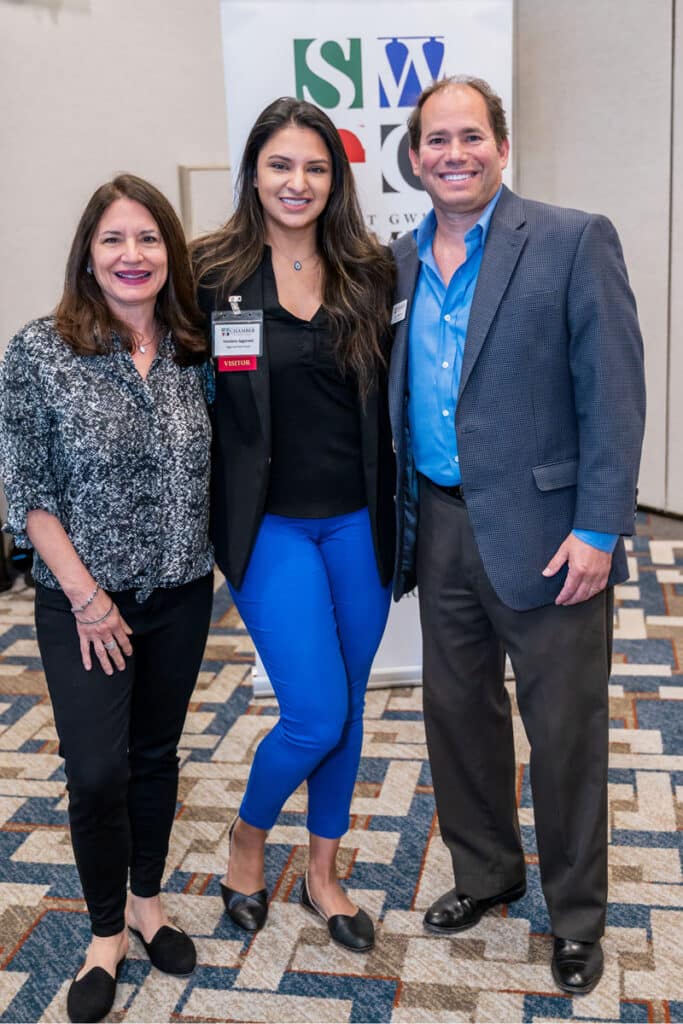
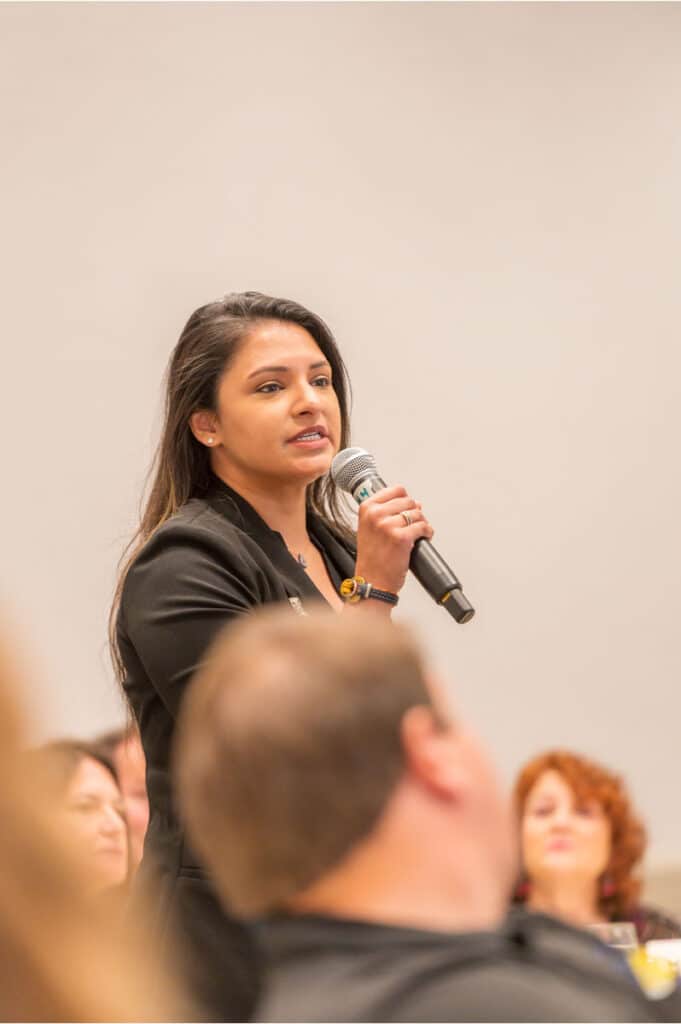
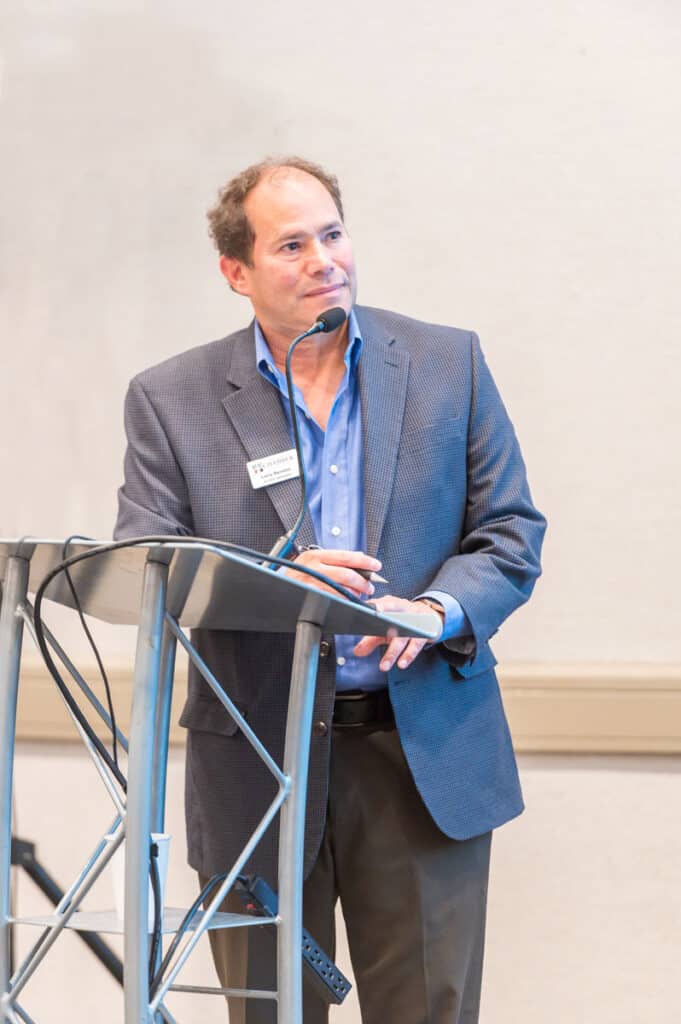
He said that the central retail area has shifted with the revitalization of The Forum and that’s making city leaders rethink city planning.
“We’re having a look at our code and things like that. But from another point of view that will drive the decision about what communities are going to look like,” he said. “For example, there are people coming into the city that say some buildings are technologically obsolete.”
Public safety
Even though Berkeley Lake is the smallest of the three cities and has the highest average home values, all the mayors agreed that public safety is a growing concern.
“Living in Norcross offers residents a dense suburban feel that’s somewhat rural compared to the city of Atlanta,” said Newton. “But some of our public safety initiatives are increasing police presence in high crime areas.”
As the only one of the three cities with a full police department, Norcross is seeking creative ways to implement effective community policing strategies to build trust and communication between law enforcement and the residents.
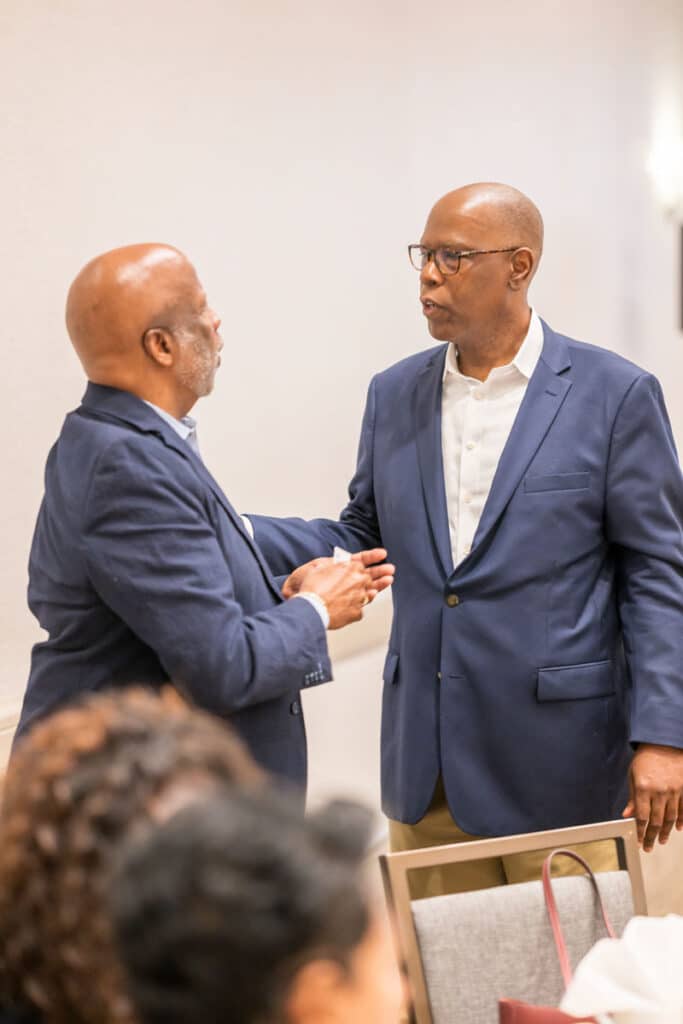
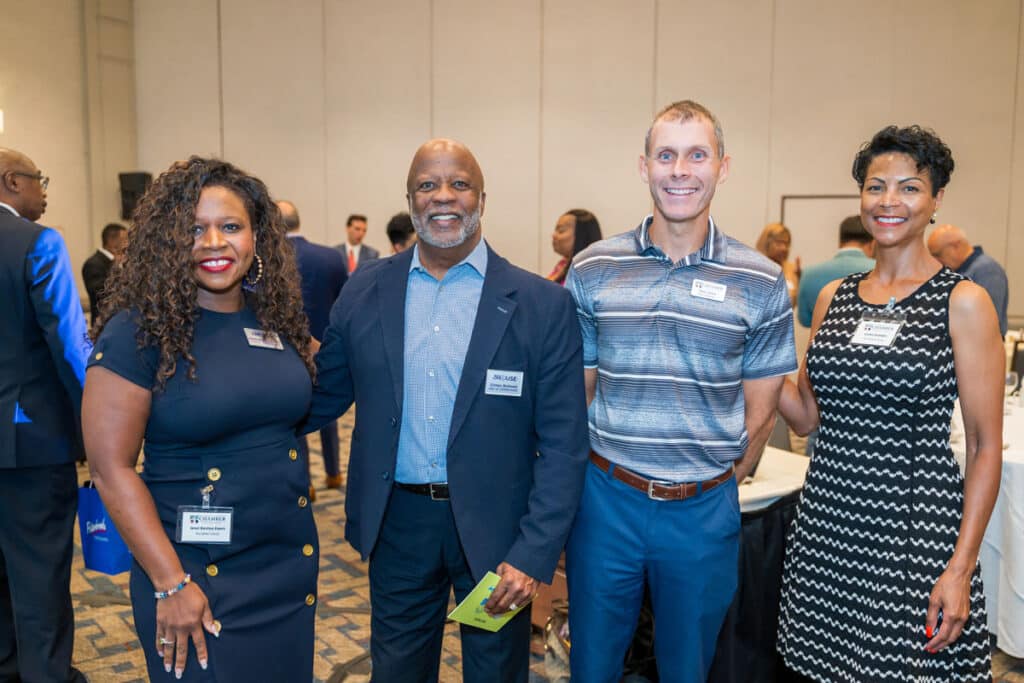
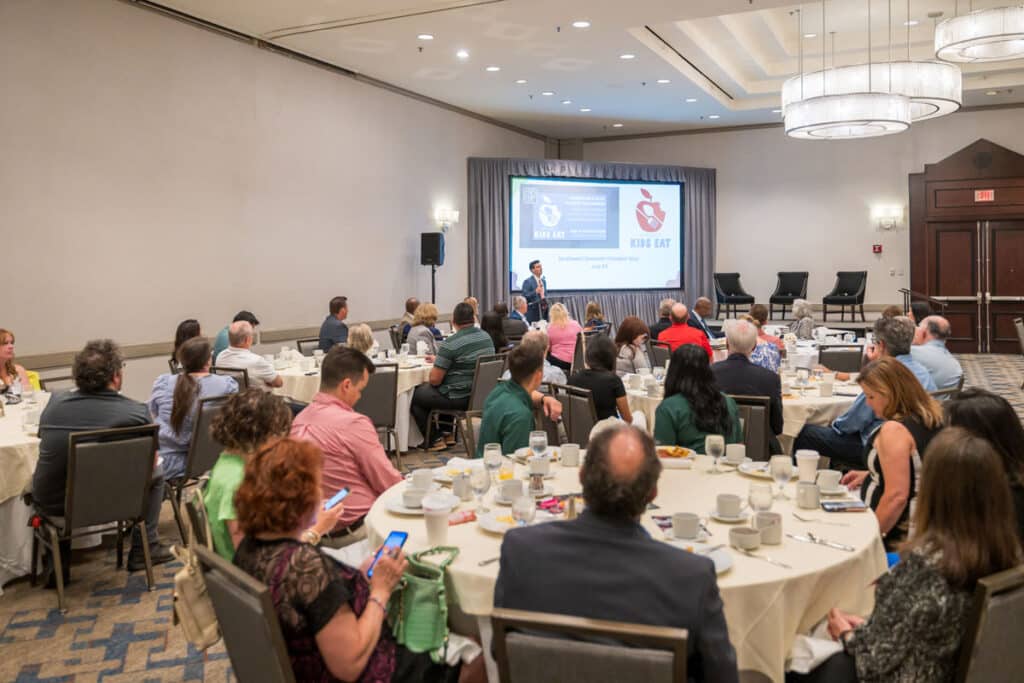
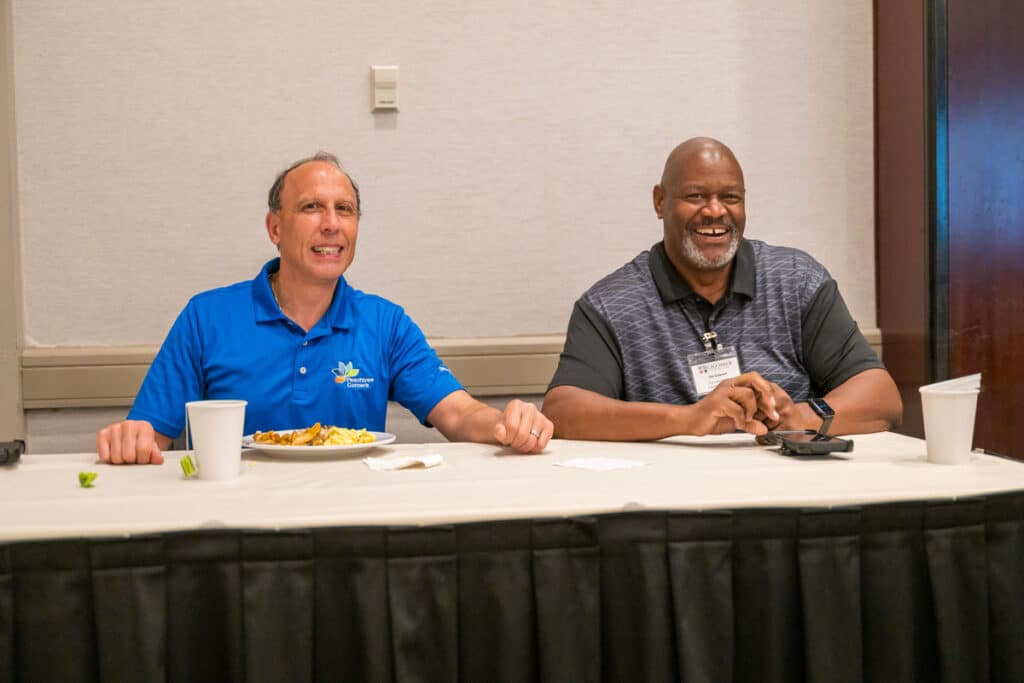
Newton mentioned programs such as Neighborhood Watch, youth outreach programs and educational initiatives along with enhancing emergency response capabilities with training for the local fire department and EMS services.
“Our response time goal is for an officer to be on-site in an emergency within 30 minutes,” he said. “But that doesn’t happen.”
Extended-stay hotels tend to attract crime, so Newton said the city has worked with owners to improve lighting in the public spaces to deter criminal activity.
“We’ve partnered with nonprofit businesses and local stakeholders to support social services employment opportunities for at-risk individuals,” he said. “By working together with various organizations and entities were able to address the complex challenge of public safety.”
Community accountability
With no police force, Berkeley Lake relies heavily on cameras and old-fashioned “knowing your neighbors,” said Salter.
“Some of our individual HOAs are buying and furnishing and paying for cameras to safeguard their neighborhoods,” she said.
Although there may be pockets of criminal behavior around the city, Salter said a police officer once described Berkeley Lake as a “black hole” of crime because there’s so little crime data.
“One of the reasons for that we feel is that historically we’ve been a very neighborly people,” she said. “There is an amazing system of community cohesiveness.”
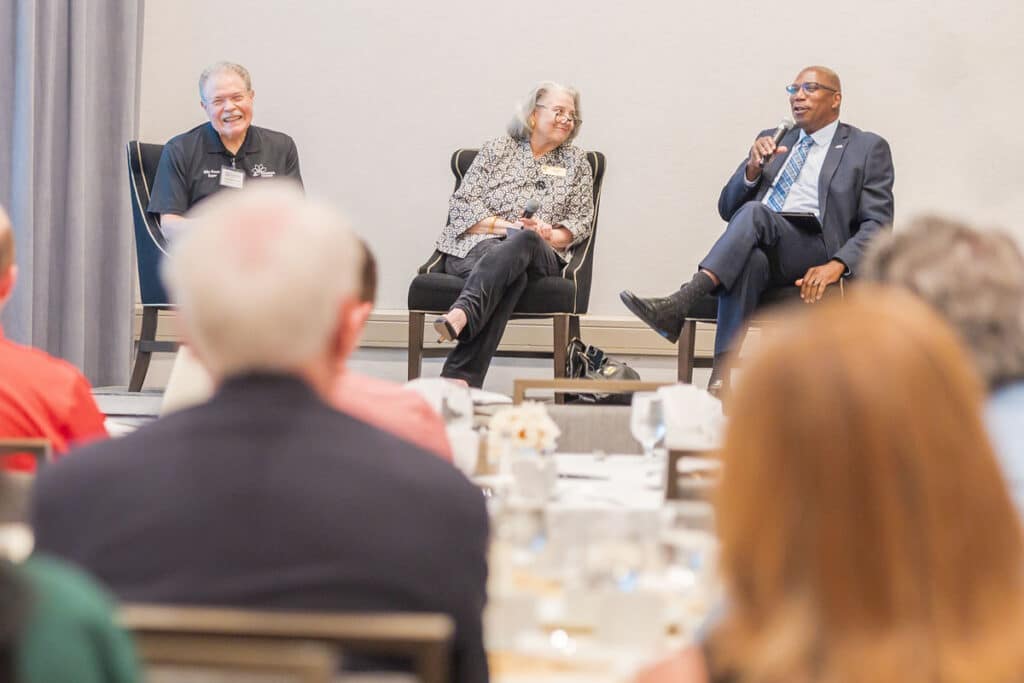
Peachtree Corners is taking its own approach.
“We’ve recently added a Marshal Service and as Lois mentioned we’re also leaning on technology,” said Mason.
The marshal department doesn’t take the place of the services provided by Gwinnett County Police, it primarily enforces city code and aids Gwinnett PD when necessary.
“We’re utilizing as much technology as we can,” said Mason.
Gwinnett PD is instructing where to locate cameras and the city keeps adding them. There have been several instances in the last year or so where coordination among agencies and the use of technology have thwarted or caught criminals.
At the end of the day, the three mayors said the cities all rely on each other. Being so close means that economic development, enhanced entertainment and other desirable amenities are boons for them all.
Related
City Government
Planning and Development is Changing in Peachtree Corners
Published
2 months agoon
June 6, 2024
From Peachtree Corners Mayor Mike Mason’s monthly column.
After the COVID-19 pandemic, the city noticed a development trend that focused on the importance of social interaction. It began seeing development applications for indoor pickleball, virtual racing, garden clubs, car clubs and other recreational uses.
When our city was established in 2012, it adopted Gwinnett County’s codes and ordinances to maintain consistency and these new social interaction-focused uses were not initially considered in the city’s current Comp Plan or zoning code.
Working from home is another market trend having a big impact on local office parks. This economic engine is driven by office parks such as Technology Park and there’s always been a priority placed on preserving office stock.
Even though the commercial office market is waning right now, that pendulum is still trying to figure out where it will settle in. Most of these new socially focused uses find the best home in an office setting.
Due to the increasing number of these applications and the evolving market trends, the city has imposed a six-month moratorium on projects in the Central Business District character area. The moratorium came into effect on May 3 and will end on November 3.
This halt will allow the city six months to pause rezoning applications, special use permits and variances applications for residential or mixed-use development. It will help the city maintain the status quo, stop new applications from coming in and allow for officials to consult with experts and delve deeper into the code and comprehensive plans.
The city plans to conduct extensive research, analysis and strategic planning during this period to help determine if any changes should be made to the comprehensive plan and zoning regulations.
For instance, it might be beneficial to designate downtown as a distinct character area separate from the central business district. Implementing new zoning regulations to transform it into an entertainment district or a unique downtown character area could be a viable option. Many cities have already adopted this type of zoning.
Office parks and businesses throughout the city provide a balance of jobs and residents that allow the city to be the second largest in the state with a zero-millage rate or no city property tax.
Therefore, as part of this process the city will research ways it can preserve, stabilize and enhance the economic engine through the activation of underutilized spaces within office parks.
This proactive approach will help maintain the job-to-resident balance that allows the zero-millage rate while positioning the city for success as the office market pendulum settles.
The most important thing this moratorium does is allow the city to consider what will work best for Peachtree Corners. Furthermore, it communicates to developers that the city requires a pause because current zoning regulations and comprehensive plan do not adequately address future goals.
Related
City Government
Peachtree Corners Welcomes New Community Development Director
Published
2 months agoon
June 2, 2024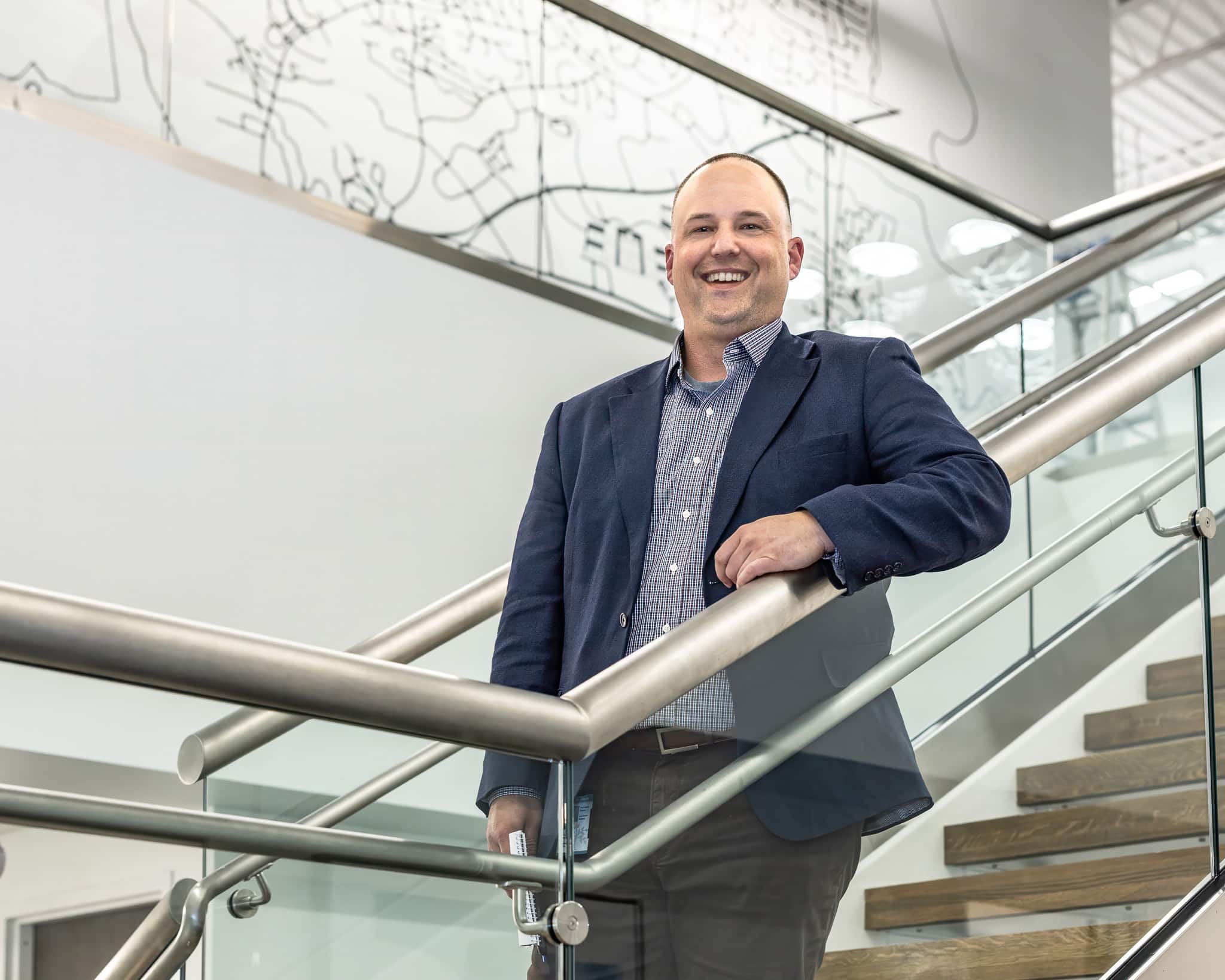
With community development director Diana Wheeler stepping down to pursue a consulting career, Peachtree Corners city leadership turned a challenge into an opportunity.
In January, Shaun Adams was hired as the assistant city attorney to oversee compliance for land use and economic development-related matters and help with legal issues.
His background in public and private sector development made him the ideal replacement.
As luck would have it, Adams moved to Georgia in 2005, selling real estate while attending law school.
“I actually started working down at the capital a lot, lobbying on various policies right out of law school,” he said. “I was the legal counsel for the Senate Judiciary, and that exposed me to ACCG, which is the State County Association, which represents all staff and elected officials for counties across the state.”
With the motto, Advancing Georgia’s Counties, ACCG helps with the policy aspect of things like training and education.
“While I was a lobbyist for them, I focused on economic development, infrastructure-related issues and whatever policies went into place,” Adams said. “We also went around the state and trained our commissioners and their staff on some of those policies and put their new processes in place.”
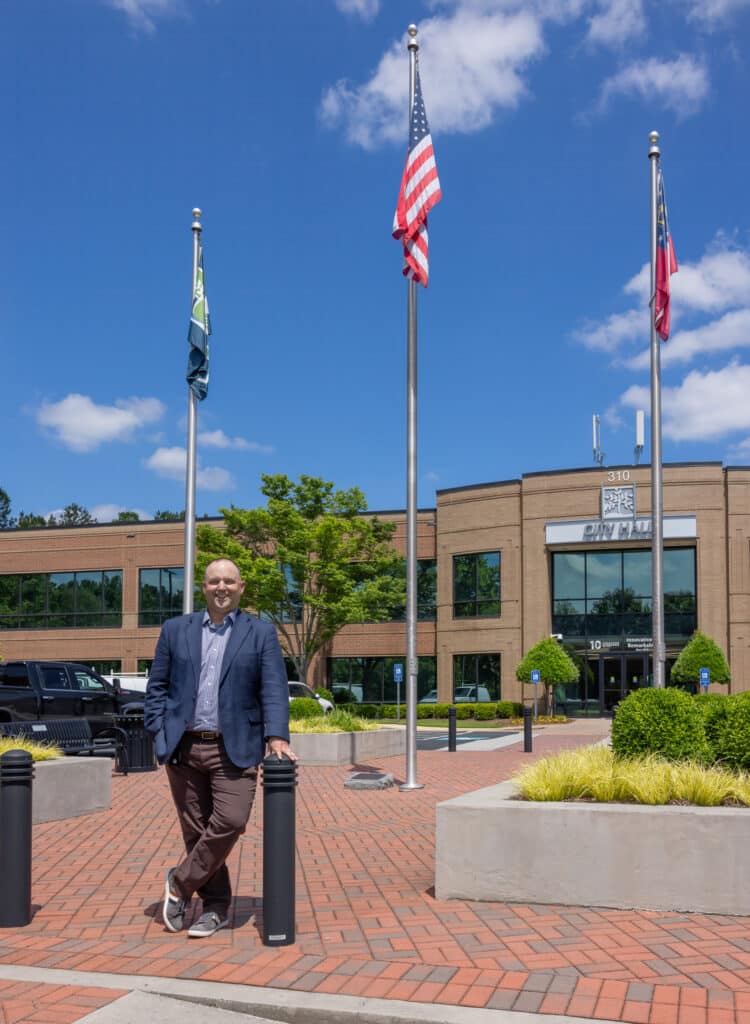
Local government possibilities
“After a handful of years, I got lured away into the private sector,” he said.
Working on land use and government relations matters from the other side of the table, Adams represented developers and investors.
“Sometimes [investors would] come to me with a property that they bought, and they’d say, ‘Hey, we bought this on investment. We’d like to see how we can make the highest and best use of it. Help us create a vision,’” he said. “So, I helped put a team together to determine what we thought could go on the site based off of local government zoning.”
His job entailed working with architects and engineers to design the site and help the client take it to market. Ultimately, the contract purchaser would come in and seek needed entitlements.
“I would help with that,” Adams said. “Those were the fun ones because you got to start on the ground.”
Adams got to know many different local government jurisdictions and worked extensively around metro Atlanta on various matters. On a busy week, he may work with five different jurisdictions across the state.
As a family man with a wife and two sons, he began looking for something that would keep him closer to home.
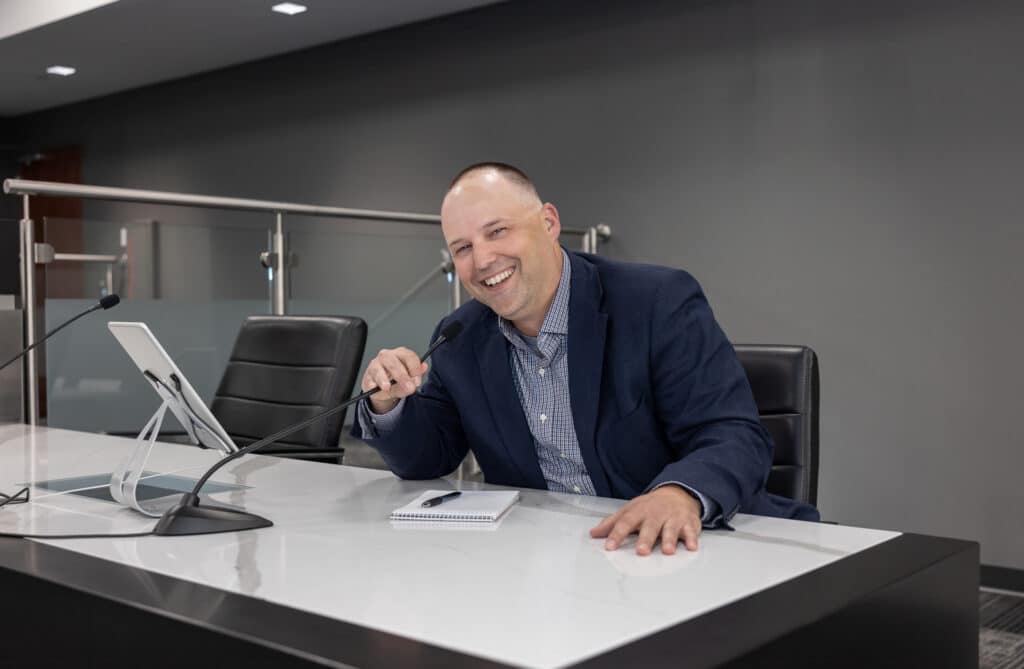
A perfect fit
City Manager Brian Johnson says it was serendipitous that Adams was looking for a position at a time when the city needed someone like him.
“It’s actually a hard position to fill, and I just happened to catch him,” said Johnson. “We were familiar with each other because he’s represented a number of clients coming before the city.”
Johnson said that Adams was legal counsel for some of the most significant developments in the last few years: North American Properties purchasing and revitalizing The Forum, housing development Waterside, and Intuitive Surgical moving its headquarters from the West Coast.
“He was on the other side of the table as we worked together to make these projects ultimately better for the city and better than they were upon their initial submittal,” Johnson said.
“And I knew then that he was a really knowledgeable guy that really knows how to deal with people. He’s a problem solver. He’s always looking for ways to figure out how to resolve conflict and navigate minefields as it relates to land use and all the laws and zoning that apply to it,” he added.
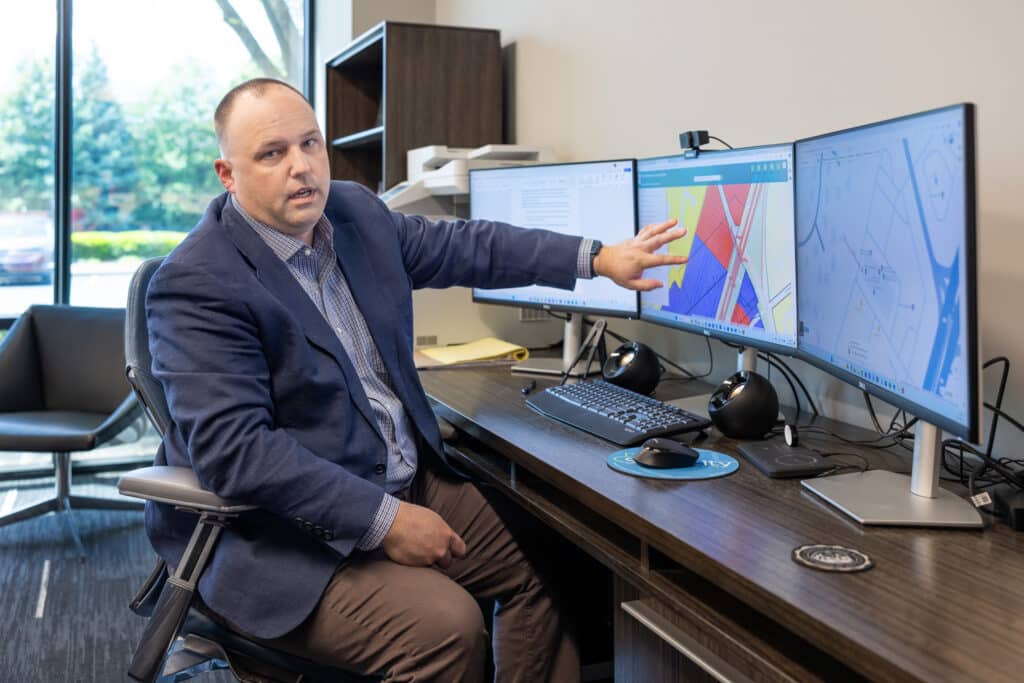
Changes to the job
Although Wheeler is no longer a staffer, she’s still doing work for the city.
With Adams’ legal background, the events planning team will be transitioning out from under community development.
“By taking that off my plate, it’ll allow me to do more with the legal side of things that the position didn’t do previously,” he said.
There will also be a shift with code enforcement duties moving under Chief Marshal Edward Restrepo.
“I moved code enforcement underneath the city marshal’s office because code enforcement and law enforcement are almost like fraternal twins — they both do very similar things,” said Johnson. “Each of them is enforcing a different level of law. Code enforcement is municipal code, and law enforcement is state code, but they work hand in hand.”
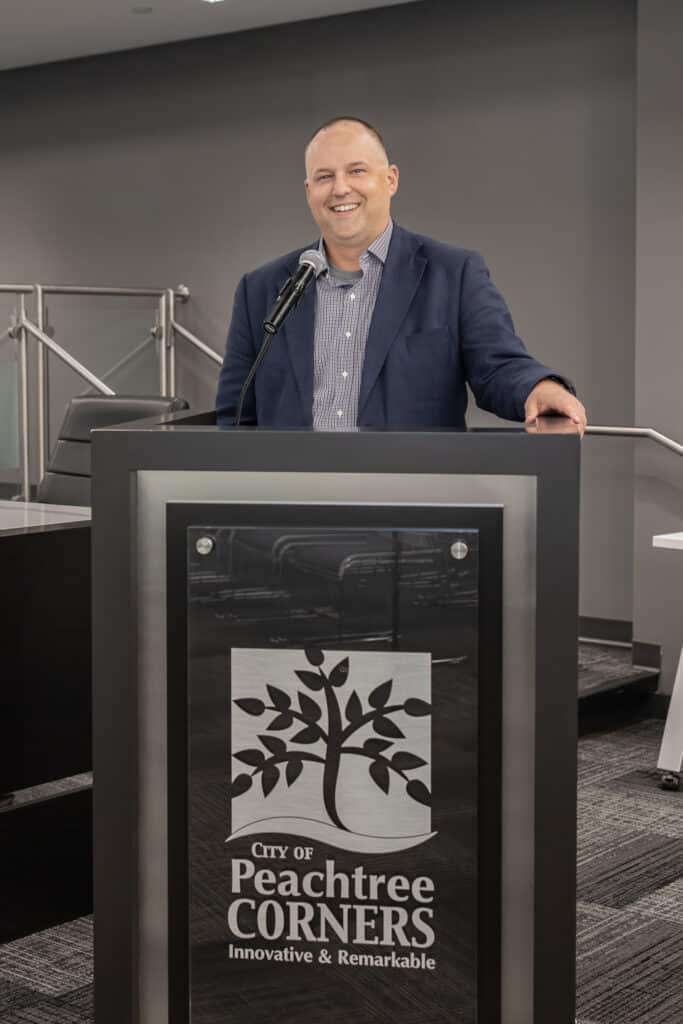
The events planning through the end of the year has already been moved from the community development director’s department. As a consultant, Wheeler will work with other contractors to manage the happenings at the Town Center. Director of Communications Louis Svehla has already moved into managing premier events, Johnson said adding that the city may use more consultants in the future under Svehla’s management.
“He has really shown his ability to manage special events very adeptly. He really showed me that skill set when we had last year’s Criterium bike race,” said Johnson. “I decided to take advantage of some opportunities, including our partnership with Audi, which we were going to announce to the whole vulnerable road user thing.”
With only three months to prepare, Svehla pulled off the event without a hitch.
“He did an outstanding job and so he is capable of taking the management of our community events, our concerts and stuff,” said Johnson.
Johnson said the city is still utilizing consultants for some aspects of special events, but if consultant fees become more expensive than hiring someone full-time to assist Svehla, he’ll make that call.
“All those moves have happened, and I’ll sum it up by just saying that I’m just playing to the strengths of these people and utilizing a great team that I have, and it’s working out really well,” Johnson said.
Related
Read the Digital Edition
Subscribe
Keep Up With Peachtree Corners News
Join our mailing list to receive the latest news and updates from our team.
You have Successfully Subscribed!

What’s going on at Jones Bridge Park and the Challenges of Urban Development

Taste of Peachtree Corners: PCBA Showcases Local Restaurants

The Forum Gives Sneak Peek of New Eateries and Community Spaces

Southwest Gwinnett Mayors Share Visions for the Future

8 Events Happening In and Around Peachtree Corners This August

Peachtree Corners Shines Bright with Light Up the Corners Glow Race this August

Peachtree Corners Shines Bright with Light Up the Corners Glow Race this August

The Forum Gives Sneak Peek of New Eateries and Community Spaces

8 Events Happening In and Around Peachtree Corners This August

Southwest Gwinnett Mayors Share Visions for the Future

Taste of Peachtree Corners: PCBA Showcases Local Restaurants

What’s going on at Jones Bridge Park and the Challenges of Urban Development

Local Resident Opens AtWork Location in Peachtree Corners

CHRIS 180 Expands its Services into Gwinnett County [Podcast]

Light up the Corners [Video]

Capitalist Sage: Business Leadership in Your Community [Podcast]

Cliff Bramble: A Culinary Adventure through Italy

Top 10 Brunch Places in Gwinnett County

A Hunger for Hospitality

THE CORNERS EPISODE 3 – BLAXICAN PART 1

Top 10 Indoor Things To Do This Winter

The ED Hour: What it takes to Remove Barriers from Education
Peachtree Corners Life
Topics and Categories
Trending
-
Business1 week ago
Taste of Peachtree Corners: PCBA Showcases Local Restaurants
-
Business2 days ago
The Forum Gives Sneak Peek of New Eateries and Community Spaces
-
City Government4 days ago
Southwest Gwinnett Mayors Share Visions for the Future
-
Around Atlanta4 days ago
8 Events Happening In and Around Peachtree Corners This August







